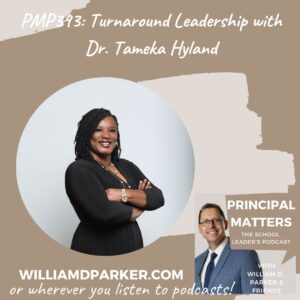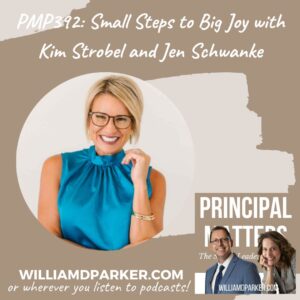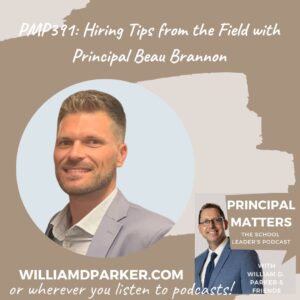Podcast: Play in new window | Download
One of the biggest challenges for the a new school year is deciding how to mitigate concerns for safety while ensuring ways to still actively engage, support, and reach students.

In this week’s podcast episode, Dr. Jeff Springer shares takeaways from his research on the power of P.L.A.Y. in schools and offers suggestions for school leaders to keep in mind as you serve either in-person or from a distance.
Meet Dr. Jeff Springer

Dr. Jeff Springer is a former Texas High School Head Football Coach and eleven-year veteran of the classroom. He is also formerly the Principal at Magnolia High School (2002-2016), in Magnolia, Texas. In 2013, he was selected as the State of Texas TASSP State Principal of the year.
An educator for 34 years, Dr. Jeff Springer is now the founder of Spring Strategies LLC and the G.O.A.L. TEAM (Getting Others to Achieve Higher Levels), created for helping high school students and young adults to maximize their personal leadership potential.
Jeff resides in Montgomery, Texas with his wife of 38 years. They have two children, and two grandchildren.
Conversations on P.LA.Y.
As a part of his dissertation work, Dr. Springer researched the power of play, especially at the secondary level. In this podcast episode, we explore how he turned those findings into an acronym for leadership takeaways:
WDP: Let’s talk about your work with educators on understanding the power of play. What are the four tenets you teach using the acronym P.L.A.Y.?
Dr. Springer: First is People. Everyone needs to feel connected. We all need others in our lives. Typically in life and in the workplace the greatest accomplishments have been obtained when a group of people all connected together achieves a common goal.
Next is Love: Impressive empathy should be evident in the leader’s relationships. Even in the specific plans to consider team members deficiencies. Every individual should be able to establish their own plan of action with the coaching of the other team members and facilitators as well. “Impressive empathy should be evident in a leader’s relationship.” – as Michael Fullan says.
Then Acknowledge: Great leaders find ways to acknowledge success in others and show transparency in their own failures. Transformative cultures thrive on acknowledgment of their most important resources – each other.
Finally, Yearn: “Positive deviance” should be an aspect of the leader’s ability to see things differently. Throughout the process, each individual must have opportunities to express their concerns and need for support in the goal areas.
WDP: How would you connect these tenets to the principal or school leader who is thinking about engaging his or her students, teachers or community members?
Dr. Springer: During my dissertation, I interviewed 12 different secondary principals (assistant and principals) in the greater Houston area. 36 face-to-face interviews about their perspectives and experiences with the elements of P.L.A.Y. The assumption is that at the secondary level, we don’t always emphasis play. There is also a gap in the research of play in secondary levels. The number one barrier was their leadership style. The challenge for leaders is to give yourself permission to “play”, use your strengths, and operate through engagement.
Your ultimate goal should be to move from excellence to eminence. Look through that lens at every program in your school. Students should be reminded every day: “You are valuable, complete and loved!“
WDP: A lot of leaders are struggling right now as they think about an upcoming school year during a pandemic as well as leading communities with concerns over inequities. What thoughts do you have for other leaders moving forward?
Dr. Springer: Stewart Brown said, “Where there is peril, there is no play.” Not playfulness, but opportunities for connecting, imagining, problem solving, collaborating and innovating. Behind food and shelter, play is the third (and often most neglected) essential all humans need. Even though safety is paramount, we must still find ways to embed this third element for students, or we will not really meet their needs.
WDP: Any other books, content or resources you’d recommend to school leaders as they want to keep growing through the summer? And any parting words of advice for school leaders?
Dr. Springer: I’d recommend Shine: Using Brain Science to Get the Best from Your People by Edward M. Hallowell. Also, the 2014 article Elements of Play, by Scott Eberley.
My parting words of advice are: Don’t underestimate the power of the principalship. Ask yourself, “Am I really making a difference?” The answer is yes! School leadership is calling. You are saving lives, and you set the tone. But you must PLAY.
How can listeners stay connected with me? Find me on Twitter @cultivatingplay. Or my website: Cutlivatingplay.org. Or reach out by email: Jeff@cultivatingplay.org.
Now It’s Your Turn
Listen to the entire episode for my takeaways and bonus conversation. This week ask yourself: What are ways I can keep people, love, acknowledgement, and yearning as tenets that inform the way I lead and serve?
Even as you take every step to ensure safety as you move forward in uncertain times, do not underestimate the power of the connections and relationships that create the learning foundations and safety-nets for your school community.


